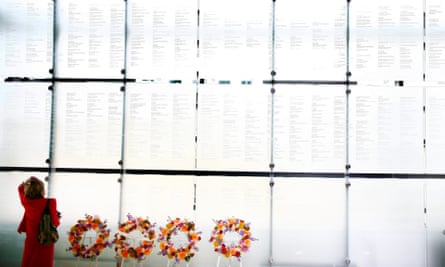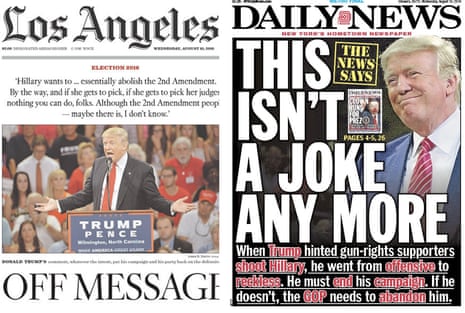Journalists in the US face a crisis of legitimacy as constant abuse by Donald Trump undermines the public’s trust in an agreed set of facts, the head of a leading media museum has warned.
Jeffrey Herbst, chief executive of the Newseum in Washington, predicted that the president’s denigration of the media would encourage authoritarian regimes to target reporters, newspapers and broadcasters around the world.
On Monday, the Newseum will rededicate its Journalists Memorial, adding the names of 14 journalists who died in Afghanistan, Brazil, India, Iraq, Libya, Mexico, Somalia, Syria and Ukraine to represent all those killed in pursuit of the news in 2016. Now, however, concerns over hostility to the press are lapping at America’s shores.
“My biggest fear in the United States is delegitimisation of journalists,” Herbst said. “This has been occurring over a long period of time: trust in the media has eroded in the United States for 20 years, partially because of complaints about the media, but frankly, trust in every institution in the United States has eroded over the last 20 years except for the military.
“But obviously in the [2016] campaign and since then, due to the attacks by the president, while some people have rallied around journalists, I think it’s also caused this crisis of legitimisation to increase.
“So that’s my big worry, that we as a society are no longer going to be able to agree on even the facts because we don’t trust anyone who’s reporting them. If you agree on the same facts but disagree on where they lead you, that’s called regular political debate, but if you disagree on the facts themselves, that’s much worse. I think part of the political problems we see in the US is we’re no longer operating off of a common fact base and if journalists who produce those facts are delegitimated, it’s bad.”
Since 2008, the Newseum has been situated on Pennsylvania Avenue, a street address shared with the White House and Trump International hotel. Its exhibits include sections of the Berlin Wall, a mangled antenna from the top of the World Trade Center, a TV news helicopter, the taped door that led to the Watergate investigation and a desk phone that belonged to Rupert Murdoch.
It will also soon receive, on loan, a pair of glasses belonging to the Guardian reporter Ben Jacobs that were broken when he was attacked by Greg Gianforte, a Republican candidate who went on to win a special House election in Montana. Critics were quick to draw a link between that incident and Trump’s fiery denunciations of the media as enemies of the people.
Asked if he feared physical assaults on reporters, Herbst replied: “I don’t know. I think the delegitimisation could lead that way. The number of actual attacks is still very small but of course I’m worried any time there’s physical violence.”
In April, the Newseum Institute issued a “first amendment report card”, in which 15 panelists from across the political spectrum assessed the state of the fundamental freedoms: religion, speech, press, assembly and petition. Press freedom received the lowest grade, a C, with panelists pointing to Trump’s campaign threat to “open up” libel laws, the “fake news” phenomenon and the president’s general enmity for the press.
Herbst, who is also a board member of the watchdog Freedom House, warned of global implications.
“I’m also worried that people take their cues around the world, to some extent, from the United States. Press freedom has been declining around the world for 10 years, according to Freedom House. To the extent that the United States, which is quite often celebrated for its free press, is having these problems, I think it gives encouragement to authoritarians across the world to intimidate, to delegitimise their journalists.”
Each day, at 5am, the front pages of newspapers from the US and other countries are put on display outside the Newseum and on its sixth floor. It might seem like a quaint gesture in an era of dwindling print circulations and digital migration. But in a museum context, elevated to the status of artifacts, the front pages command attention in a way a screen cannot.
On Friday, responding to Trump’s decision to withdraw from the Paris climate agreement, a New York tabloid depicted the Statue of Liberty engulfed by rising seas. On Monday, the front pages will be blacked out as part of the third annual #WithoutNews campaign to raise awareness of the threats to journalists around the world.
Although the New York Times and Washington Post have gone toe to toe in the Trump era, often setting the agenda in an old-fashioned newspaper war, Barack Obama is among those who argue that the media landscape has been fragmented by cable news and social media, making it harder to agree upon a “common set of facts” than in the era when most people watched the evening news on ABC, CBS or NBC. Suddenly, truth itself appears to be up for grabs.

Herbst said: “The gatekeepers have been torn down and they were seen as the three network anchors and two or three newspapers. They were given a high degree of legitimacy across the society and they established a common news agenda for everyone.
“We just celebrated the centennial of Walter Cronkite’s birth. There’ll never be another journalist that had his agenda-forming ability. He said: ‘That’s the way it was’, and for a large number of Americans, it was.
“The gatekeepers being torn down, in my view, is very positive overall because they were a relatively few people, overwhelmingly white, overwhelmingly male, overwhelmingly New York. It wasn’t diverse. What we have now is the information ecosystem is completely open to anyone, so that a 17-year-old can have 10 million followers on YouTube, expending very little money, if any, to get that.
“That’s brought in, in my view, lots of new ideas, lots of new information, lots of perspectives that we never had before.”
Herbst has caveats, however. “I think it is net very positive but there have been, at the same time, a lot of people that have their own agendas, who are spreading false information deliberately to try and make it viral,” he said. “To some extent the business incentives of the current internet reward people with money if they get a lot of clicks, so there’s a bias towards sensationalism.
“And this has all happened so quickly, really in the last five years, with the internet and Facebook, that I don’t think the American consumer or people around the world have adjusted yet. Basically people are going to have to go from being on receive – if Walter Cronkie said this, and the New York Times said it the next morning, then it was probably true – to being much more sceptical and much more intentional consumers.
“‘What’s their agenda, is it likely to be true?’ You can be better informed today than ever before, but it takes a little work.”
